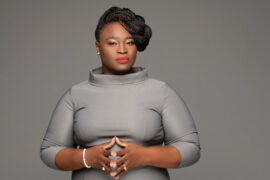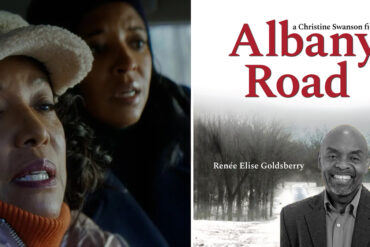Cottage Grove is a film by Chicago native, writer, and director George Ellzey Jr. that explores a broken relationship between father and son and how a brief encounter begins the healing process and possibly opens the door to forgiveness and reconciliation.
Set against the backdrop of Chicago’s Bronzeville neighborhood, Ellzey Jr. captures the pain and trauma of time lost and the transformational power of vulnerability. He recently discussed his film with Reginald Ponder.

Reginald Ponder: Cottage Grove is an exploration of that father-and-son relationship. What was the inspiration for tackling this very tough subject? Because for many different reasons, fathers and sons can have a fracture in their relationship.
George Ellzey Jr.: Cottage Grove is a story loosely based on an experience with my father in the summer of 2021 when I picked up my dad from the University of Chicago Hospital. We drove to the Walgreens on 49th and Cottage Grove and his girlfriend went inside to get food.
It was the first time my father and I spent time together in one place. Unlike the film, we didn’t talk. We just listened to jazz music for about 30 minutes. That was the genesis of the story. And to be honest with you, I didn’t want to tell it at first because it scared me—mainly because of my wounds from my father, just the tension that I felt from that. Thanks to a mentor who encouraged me to lean into it, I was able to strip away my own personal connection to the story—meaning my experience with my dad—and allow for this father and son story, this fictional father and son story, to take a step forward. And, yeah, it’s been a healing process for me throughout this whole experience.”
Reggie: I’m going to push back on that—were you really able to strip away your own personal connection? Because there are some important yet seemingly personal aspects that you tackle here.
“That’s the beauty of living in Bronzeville—the world around us, the story around us, is a character in itself.” —George Ellzey Jr.
George Ellzey Jr.: I think there are some—there’s an element of who I am in there. I can’t negate that at all. But if it was truly like my experience with my dad in the car, it would have been a longer film. There would have been more crying. It would have been more dramatic. There’s an essence of how I felt being in that car with my dad that is captured in the actors’ performances. The film is an exploration of my experience, stories that my friends—specifically my guy friends—have with their dads and their mothers sometimes, as well as questions that I wanted to explore in this film in general. Cottage Grove is a nice jambalaya of my story and other people’s stories, which lessens the blow for me.

Reggie: It is very clear that there’s a lot of pain that the main character, Emmanuel, has in this film. At the beginning of the film, similar to your actual experience, the two of them didn’t talk. At that moment, two things stuck out for me: there was a need for an apology, and there was also a need to express how the father’s actions impacted Emmanuel over his lifetime. Can you speak to that?
George Ellzey Jr.: That connects to a little bit of my own personal story. So after my parents divorced when I was younger, my dad was not in my life, but I felt as if his presence was always there. He used to work right down the street from where we lived, but we didn’t know that until recently. But it felt like his presence was just a ghost in my life, and as a result, I always daydreamed and wondered what my life would have been like, and who I would have become if he had stayed. And yes, to your point, it’s about getting a version of an apology, but it’s also a chance for both of the men to express how they feel about their relationship. Emmanuel’s expression is a little bit stronger and more pointed. However, his father’s expression is just as impactful because his character feels slighted about their experience. What I wanted to do with this film was to show the humanity on both sides, because it’s easy in father and son stories for one to be the hero and one to be the villain. There’s so much complexity to these characters that I wanted to explore in this film.”
Reggie: You do explore that complexity in so many interesting ways. There’s a scene in the film where the two men are looking out the car’s front window, and they see a mother and father arguing. The mother tells the father in so many words that he hasn’t been there for his son and can’t just insert himself as an authority. But at the same time, while they have that conflict, you show this tender moment between the father and the son. Speak to what was going through your head in terms of providing that perspective.
George Ellzey Jr.: Two things can be true. Someone can have a checkered past but still, in that moment, want to be the best that they can be for their family or for anyone in general. Particularly for that young family, I wanted to first show the history of Senior and Emmanuel without doing flashbacks or cutting to another scene. That’s the beauty of living in Bronzeville—the world around us, the story around us, is a character in itself. And also, I wanted to show the complexity of this relationship. Even though this young father was not present in his young son’s life, he’s present right now. That complexity of wrestling with the past and the present is something that I deal with and wanted one of the characters to explore as well.


Reggie: There’s this powerful scene where Senior says, “Dude, I know,”and Emmanuel is offended and angry by the suggestion that his father knows anything about him. Emmanuel angrily says, “Nah, you don’t know.”Were you trying to broach the sometimes taboo discussion in some parts of the Black community about sexuality and particularly homosexuality?
George Ellzey Jr.: I wanted to explore how Senior and Emmanuel are more alike than Emmanuel realizes. This goes back to my own experience with my dad. As we were rebuilding our relationship, my father told me, “George, you have an anger problem.” And I told him, “What are you talking about? I don’t have an anger problem.” But it was true. And I think there’s something in our DNA that parents can recognize in their children that their children can’t see in themselves. So that was the leading part of that conversation.

Reggie Ponder: Cottage Grove had a run at The Music Box Theatre during Black History Month, but now that the run is over, where can people view the film?
George Ellzey Jr.: So I’m super grateful for our screening at The Music Box, and thanks goes out to Tyler Balentine. I’m happy to report that recently our film was acquired by AMC Plus, thanks to the Tate brothers, Troy Pryor, and the XL Festival. So people can go on to AMC Plus to stream Cottage Grove among other short films that are in that collection. If you don’t have AMC Plus, check out the seven-day free trial like I did and watch the film.
Cottage Grove is a short film that tackles huge issues and may even have you questioning your own child-parent relationship. N’DIGO will continue to follow Chicago’s own George Ellzey Jr., as he revealed he is working on his first feature film. Stay tuned. Ellzey Jr.’s ability to find universal themes in personal narratives marks him as a filmmaker to watch closely.






